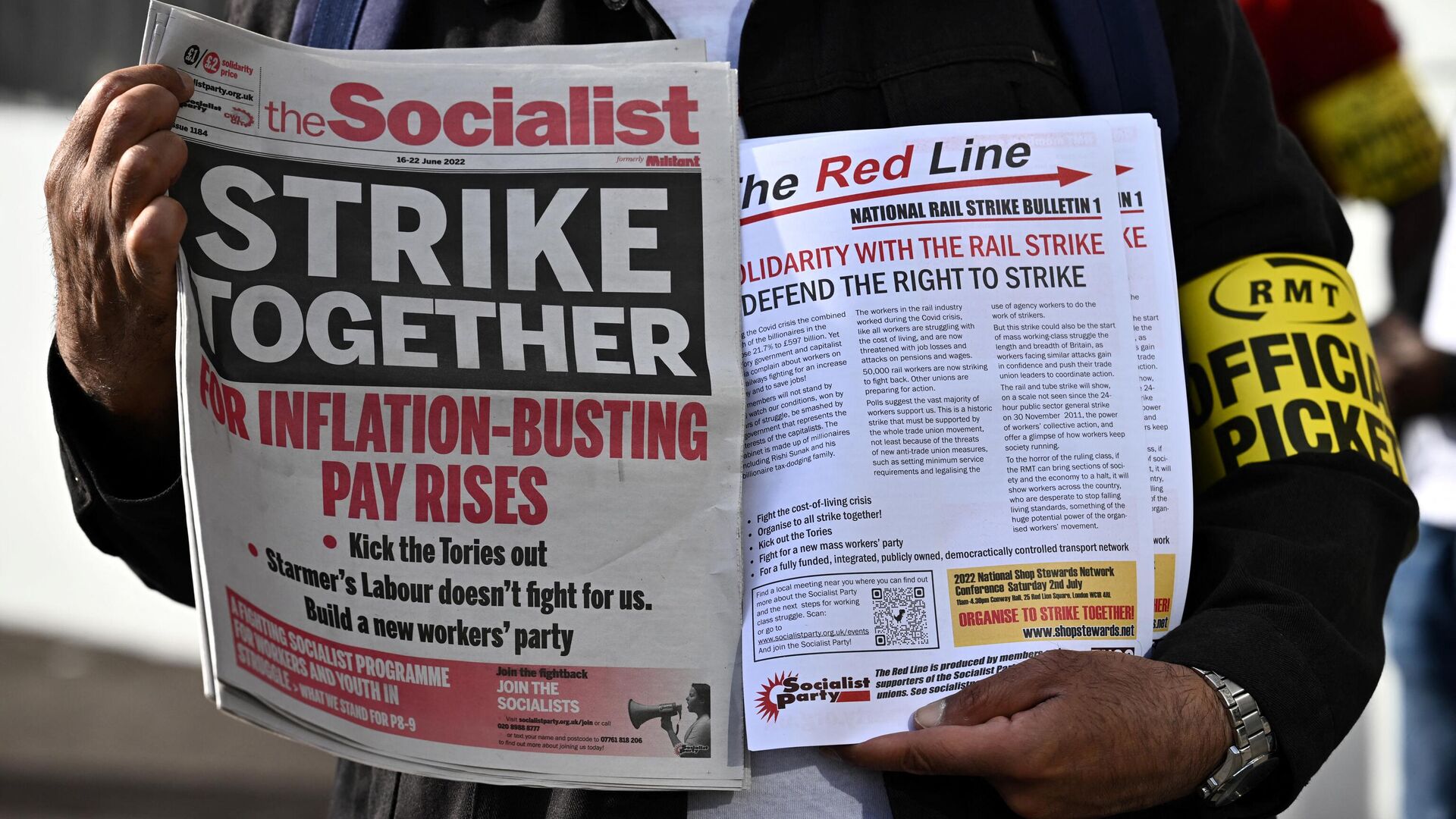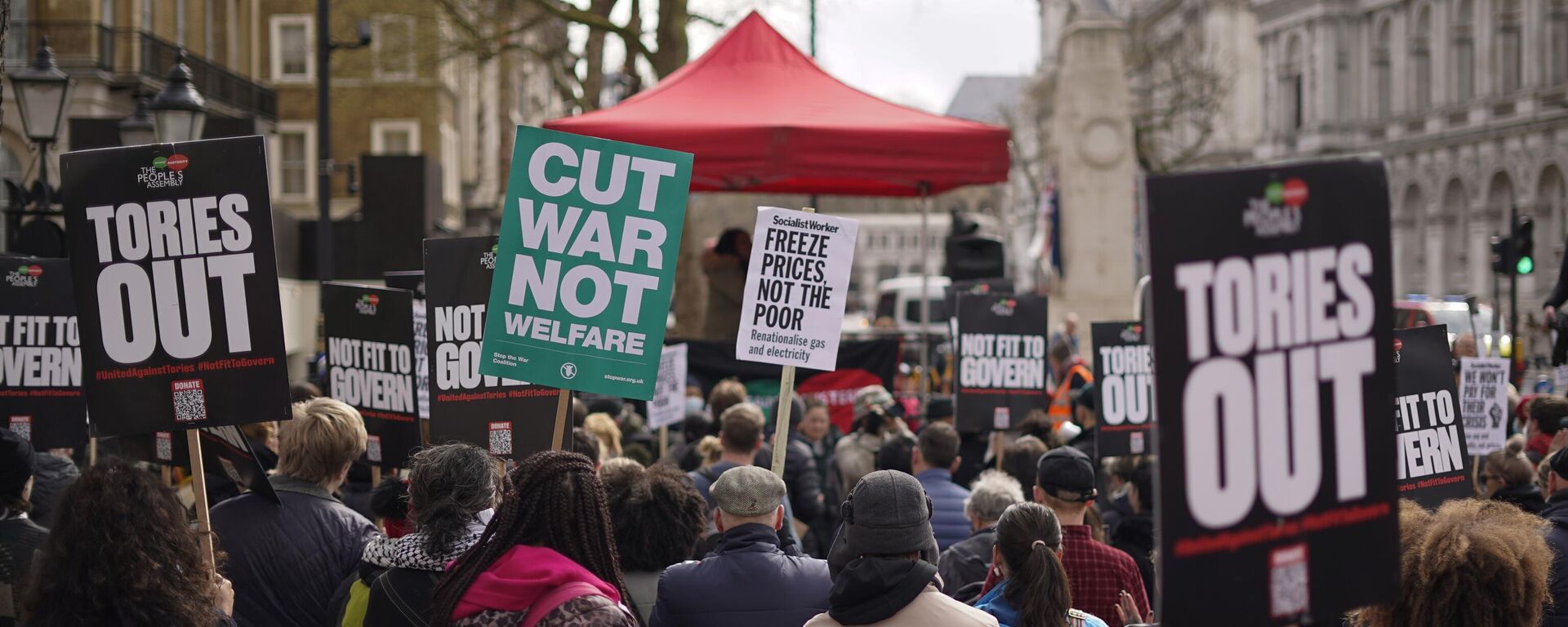BoJo to Urge ‘Sensible Compromise' With Unions as Rail Strikes Over Pay Threaten Chaos
08:41 GMT 21.06.2022 (Updated: 15:19 GMT 28.05.2023)

© AFP 2023 / BEN STANSALL
Subscribe
Thousands of staff at Network Rail and 13 rail operators walked out on Tuesday, affecting most major lines in England, Scotland and Wales, after last-ditch talks failed. With similar action slated for 23 June and 25 June, RMT's Mick Lynch blamed the "dead hand" of government, accusing ministers of not allowing employers to negotiate freely.
With Britain crippled on Tuesday by its largest railway strike in three decades, Boris Johnson will use a Cabinet meeting to urge a "sensible compromise" with the trade unions over pay settlements, UK media outlets reported.
“Too high demands on pay will make it incredibly difficult to bring to an end the current challenges facing families around the world with rising costs of living,” the Prime Minister is set to tell his ministers.
“Sustained higher levels of inflation would have a far bigger impact on people’s pay packets in the long run, destroying savings and extending the difficulties we’re facing for longer,” Johnson is reportedly to argue.
National Rail & London Underground Strikes: RMT statementhttps://t.co/Su77c7Vvd0 pic.twitter.com/ySnSbhsl4y
— RMT (@RMTunion) June 20, 2022
Earlier, in remarks released by Downing Street on Monday night, the PM warned that industrial action by unions was “harming the very people they claim to be helping." Boris Johnson said that the will drive away commuters who “ultimately support the jobs of rail workers”.
TEFL #union members out on the picket line to show #solidarity with today's tube and rail #strike!
— TEFL Workers' Union (@TeflUnion) June 21, 2022
#tefl #elt #eap #esol @RMTUnion @RMTLondon @bakerloormt @RMTYoungMember @hughdellar @EapForSJ @StrikeMapUK @Union_NewsUK @TUFAC4 @labourstart @ZHoursJustice pic.twitter.com/zlvYUXEB1L
This comes as around 50,000 members of the National Union of Rail, Maritime and Transport Workers (RMT) union began the first of three one-day strikes in a dispute over pay, jobs and conditions, threatening vast disruption across much of Great Britain.
Last minute talks between the main union, demanding a pay rise in line with the cost of living, and the railway operator collapsed on Monday night.
Ttrack manager Network Rail’s proposal was rejected on Friday, and another one from train companies was turned down on Monday, according to RMT general secretary Mick Lynch.
Watch this! Mick Lynch @RMTunion explaining where the money has gone. https://t.co/722fLX3tvG
— Claire Hegarty (@msclairehegarty) June 21, 2022
At a news conference on Monday Lynch blamed the “dead hand” of the government for the impasse. He underscored that the root of the problem is £4 billion ($4.9 billion) of budget slashes that are “hobbling this industry”. Rail operators have offered workers a 3 percent salary increase, which has been rejected by the RMT amid forecasts of inflation to hit 11 percent.
The RMT union is asking for a pay rise of 7 percent, which is still lower than inflation.
Lynch insisted that pay was not keeping pace with inflation while railing against job cuts and a lack of guarantees against compulsory redundancies.
After talks fell through, most trains ground to a halt on Tuesday for the first of three days of strikes. In London, workers in the Underground system also walked out in a separate wage dispute. About 20 percent of rail services are to survive the stoppages.
The UK Transport Secretary Grant Shapps accused the RMT of ‘misleading’ the public on the issue of pay. He told MPs in the Commons on Monday that the “whole country is being held to ransom by the union barons… without any regard for how the rights of others are disrupted".
🥀 Labour once again failed to condemn this week's strikes.
— Conservatives (@Conservatives) June 20, 2022
❌ Strikes that will hit workers, students, and our Armed Forces.#StopLaboursStrikes pic.twitter.com/uJ8XuxuQuJ
However, the opposition Labour party said the strikes will represent a "catastrophic failure of leadership" by ministers. Shadow transport secretary Louise Haigh slammed Shapps, saying: "Not only has he been boycotting the talks, he's tied the hands of those at the table."
Besides industrial action by rail workers, strikes are looming across the public sector, ranging from teachers and National Health Service (NHS) staff to criminal defense barristers.
This comes as Britain is facing a growing cost of living crisis, fueled by energy and food prices surging. Even when adjusted for inflation, pay across public sectors has been declining at the fastest pace in more than a decade.
The government is facing increasingly urgent calls to help Britons cope with the economic crisis. Downing Street on Monday night that ministers at the Cabinet meeting would discuss both the rail strikes and the tough economic climate facing the country.




